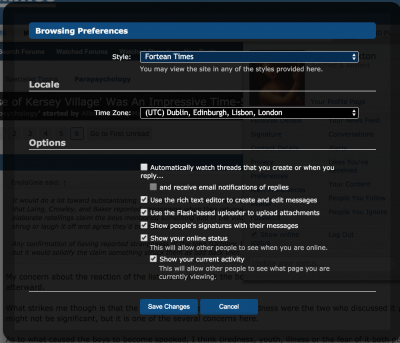but that's the trouble, you 'don't think' they were tired, but of course like the rest of us you can't know, you can't point to anything that demonstrates their state of mind, level of tiredness, or anything else, because all we have is an impression recalled 30 years later. And that is where the weakness lies, you did work on memory Carl so you know this probably much better than I.
Yes Carl, the same applies to crytpozoology, UFO's, ghosts, and any other paranormal occurrence. The single weakest link in all of these are the human observers. So I say that I don't accept the idea of time slips, why would I though? We have no evidence in favour, and plenty of evidence against.
As far as I'm concerned I'll look at anything within reason, but if it's immediately obvious that there's a simple explanation that'll be the one I'll go for. I want the same level of scrutiny for the uncanny as I do for everything else.
Unfortunately in many situations, not just the paranormal, but in crime, intelligence, and other areas of human life, we are dependent upon human testimony. And humans are not, on the whole, great witnesses. In these areas, this fact just comes with the territory. Policemen don't say, "why bother investigating crime, there's no proof of it?" The CIA don't say, "you can't trust anyone, so there's nothing we can do." They develop ways of assessing information, they look for correlations between the information they get from different sources, assess individual statements and backgrounds, and make decisions based upon sensible and reasonable analysis of the situation.
In studying paranormal (so-called) topics, we should employ essentially similar strategies. When I say so-called I mean something quite precise: areas of human experience are all treated differently in different cultures. Some things are considered real and acceptable, others are "tabu" or heretical. It is hard for me, at any rate, to view our own western culture's treatment of certain puzzling but interesting phenomena with anything but scorn. Surveys show that a large percentage of the population have indeed experienced such things, whereas one can easily think of some experiences that only a tiny proportion of people encounter, but which
are regarded as acceptable. I have experienced a lot of phenomena during my life and don't view them as weird or uncanny or scary or whatever. They are just part of my -- if not everyday, quite frequent experiences. Many cultures accept telepathy, ghosts, clairvoyance etc. as quite natural. Perhaps because of the development of science in the West, many have adopted a sceptical and narrow-minded attitude towards them. Others have been trained by our society to view them as frightening, evil, sinister and so on.
Time slips are something I haven't experienced, but I think they are quite important. If they do happen, they imply that our view of reality is defective. This shouldn't surprise us, as lots of information points the same way, notably from developments in physics and cosmology. Studied in isolation, by people of your mindset, time slips will automatically be discarded as irrelevant or delusional. Studied in the context of 100s of other reports, many coming from people who have never heard of the phenomenon and who are often left confused or upset by what happened, a very different picture emerges. Patterns appear and can be correlated with other factors.
All sciences once began in this way. Humans observed the skies, the sun, moon and stars, and gradually built up an increasingly sophisticated model of the heavens. They observed odd connections between what seemed like totally different things -- lightning, frogs legs twitching, pieces of amber attracting small objects, lodestones always pointing north -- what nonsense! And yet gradually our knowledge of electricity developed and reached the stage of systematic experiment and theory-building. Had enough sceptical people been around in those early days, the whole process would have been strangled at birth.
What really mystifies me is why someone with your views, which appear to be overwhelmingly negative in this regard, takes any notice at all of a website which is concerned with Fortean phenomena, those rejected by conventional science as damned (in Fort's words). If you think that nothing reported by people can be given credence, why concern yourself with threads that deal basically with such reports and little else?




